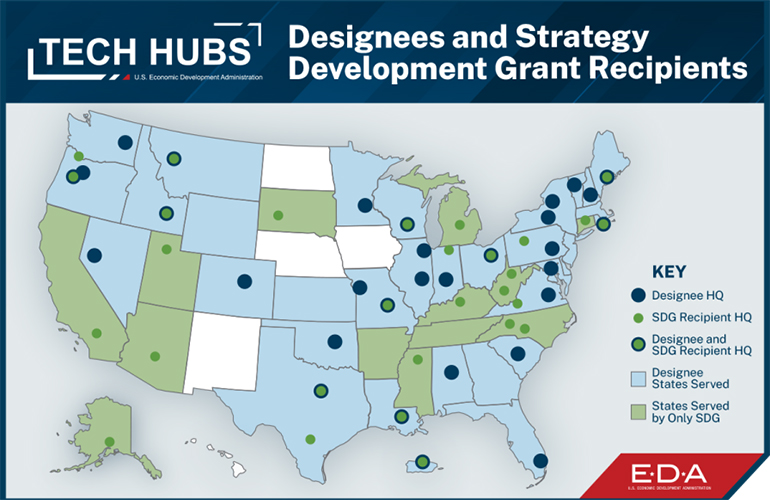
The Minneapolis-St. Paul metro tech hub is competing for federal funding to advance medtech innovation and jobs. (Photo by Nicole Harrington via Unsplash)
The Biden Administration has designated the Minneapolis-St. Paul metro and Puerto Rico as medtech hubs in a U.S. Department of Commerce competition for $500 million in funding.
The U.S. Department of Commerce’s Economic Development Administration (EDA) designated 31 hubs across the country to drive regional innovation and job creation, the agency said this week. All are eligible to apply for $50-$75 million in funding each. EDA will select five to 10 hubs for funding.
The EDA also awarded strategy development grants (SDGs) to fund regional coordination to make them more competitive for future funding. Grant recipients include the Phoenix metro’s Medical Device Manufacturing Multiplier Strategy Development Consortium.
EDA-designated tech hubs include regions focused on predictive healthcare, personalized medicine, pharmaceuticals, biopharmaceuticals, biotechnology and biologics manufacturing.
Other EDA hubs are working on semiconductors, lithium batteries, sustainable polymers, additive manufacturing, critical minerals, quantum computing, offshore wind energy, nuclear technology, mass timber, and autonomous systems. Boston, for example, is included in the new Ocean Tech Hub of Southeastern New England covering Rhode Island and Massachusetts. That hub is focused on machine learning-enabled robotics and sensors.
A full list of the tech hubs and SDG recipients is at the bottom of this post with links to more information.
The Minnesota MedTech 3.0 hub
The Minnesota MedTech 3.0 hub covers the Minneapolis-St. Paul-Bloomington region, which extends into Western Wisconsin. Led by the Minneapolis Saint Paul Economic Development Partnership (which also calls itself Greater MSP), the hub “aims to position Minnesota as a global center for ‘Smart MedTech’ by integrating artificial intelligence, machine learning, and data science into medical technology,” EDA said in a news release.
“Leveraging its medical technology ecosystem and concentration of hospitals, research institutions, and medical device manufacturers, the MedTech Hub 3.0 will work to capitalize on regional assets to drive innovative collaboration in the MedTech sector,” the EDA continued.
Greater MSP said the Minnesota MedTech 3.0 coalition will seek funding this winter and hopes to launch new data exchanges for specific diseases and technologies, startup incubators and acelerators, expanded access to medtech infrastructure, workforce strategies and equity initiatives.
The Minnesota MedTech 3.0 coalition includes Allina, Boston Scientific, Brown Venture Group, Center for Economic Inclusion, Fogarty Innovation, gener8tor, Governor’s Workforce Development Board and Minnesota Department of Employment and Economic Development, HealthPartners, Mayo Clinic, Medica, Medical Alley Association, Metropolitan Economic Development Association, Medtronic, Minnesota State, Minnesota Technology Association, MN SBIR, MSP Equity Fund, Shakopee Mdewakanton Sioux Community, State of Minnesota–Office of Governor Tim Walz, University of Minnesota, and Vensana Capital.
“Medtronic is proud to be a leader in Minnesota MedTech 3.0 alongside so many other great partners,” Medtronic Chair and CEO Geoff Martha said in a Greater MSP news release. “This is a tremendous opportunity for Minnesota, and we’re committed to using our resources to ensure the success of this Tech Hub.”
Puerto Rico’s PRBio Tech Hub
The Puerto Rico Science, Technology and Research Trust leads the PRBio Tech Hub, which “will advance the region as a global leader in biotechnology through fast-tracking the discovery, development, manufacturing, and supply of next-generation biotechnology and medical device products to detect, treat, and cure diseases and ailments,” EDA said in a news release.
The PRBio Tech Hub also won an SDG to “increase local coordination and planning activities to strengthen its region’s capacity to manufacture, commercialize, and deploy critical technologies.”
New Hampshire’s ReGen Valley Tech Hub
The Advanced Regenerative Manufacturing Institute leads the ReGen Valley Tech Hub, which “aims to make New Hampshire a global leader in biofabrication to produce cost-effective regenerative therapies that address chronic disease and organ failure,” EDA said in a news release.
“Amidst growing commercial demand for these therapies and building on a recent EDA Build Back Better Regional Challenge award, this Tech Hub seeks to advance biofabrication-related therapies, invest in manufacturing facilities, and incubate technology startups to secure domestic regenerative therapy development and biofabrication,” the EDA continued.
Ohio’s Sustainable Polymers Tech Hub

Tech Hubs designees
- Safe and Effective Autonomous Systems
- Headwaters Hub – smart photonic sensor systems in Montana
- Ocean Tech Hub – ocean robotics, sensors, and materials in Rhode Island and Massachusetts
- Trustworthy & Equitable Autonomous Systems Tech Hub – secure autonomous systems in Oklahoma
- Maintaining Our Quantum Edge
- Elevate Quantum Colorado – quantum information technology in Colorado
- The Bloch Tech Hub – quantum computing and communications in Illinois, Indiana and Wisconsin
- Advancing Biotechnology: Drugs and Devices
- Advanced Pharma Manufacturing Tech Hub – active pharma ingredient manufacturing in Virginia
- ReGen Valley Tech Hub – organ and tissue biofabrication in New Hampshire
- iFab Tech Hub – precision fermentation and biomanufacturing in Illinois
- Kansas City Inclusive Biologics and Biomanufacturing Tech Hub– vaccine-related biologics and manufacturing in Missouri and Kansas
- Heartland BioWorks – biologics manufacturing in Indiana
- PRBio Tech Hub – biopharmaceutical and medical device manufacturing in Puerto Rico
- Advancing Biotechnology: Precision and Prediction
- Wisconsin Biohealth Tech Hub – personalized medicine in Wisconsin
- Baltimore Tech Hub – predictive healthcare in Maryland
- Birmingham Biotechnology Hub – equitable AI-driven biotechnology in Alabama
- Greater Philadelphia Region Precision Medicine Tech Hub– end to end precision medicine in Pennsylvania, Delaware, Maryland and New Jersey
- Minnesota MedTech 3.0 – smart medical technologies in Minnesota and Wisconsin
- Accelerating Our Energy Transition
- Gulf Louisiana Offshore Wind Propeller – offshore wind and renewable energy in Louisiana
- Intermountain-West Nuclear Energy Tech Hub– small modular reactors and microreactors in Idaho and Wyoming
- SC Nexus for Advanced Resilient Energy – clean energy supply chain in South Carolina and Georgia
- South Florida Climate Resilience Tech Hub – sustainable and climate resilient infrastructure in Florida
- New Energy New York (NENY) Battery Tech Hub – end to end battery development and manufacturing in New York
- Strengthening Our Critical Minerals Supply Chain
- Critical Minerals and Materials for Advanced Energy (CM2AE) Tech Hub– critical mineral processing in Missouri
- Nevada Lithium Batteries and Other EV Material Loop – lithium batteries and electric vehicle materials in Nevada
- Regaining Leadership in Semiconductor Manufacturing
- Texoma Semiconductor Innovation Consortium – fablet-based semiconductor manufacturing in Texas and Oklahoma
- Corvallis Microfluidics Tech Hub – microfluidics platforms in Oregon
- Advancing GaN Tech Hub – gallium nitride-based semiconductors in Vermont
- NY SMART I-Corridor Tech Hub – end-to-end semiconductor manufacturing in New York
- Growing the Future of Materials Manufacturing
- Sustainable Polymers Tech Hub – sustainable plastics and rubbers in Ohio
- Forest Bioproducts Advanced Manufacturing Tech Hub – sustainable wood biomass polymers in Maine
- American Aerospace Materials Manufacturing Tech Hub – aerospace materials manufacturing in Washington and Idaho
- Pacific Northwest Mass Timber Tech Hub– mass timber manufacturing and design in Washington and Oregon
Strategy Development Grant (SDG) recipients
- Advanced Manufacturing of Critical Materials Strategy Development Consortium
- Alaska Tech Strategy Development Consortium
- Black Hills Deep Underground Frontier Strategy Development Consortium
- Carolinas Innovation Center for Optics and Metrology (CICOM) Strategy Development Consortium
- Corvallis Microfluidics Tech Hub (*Tech Hubs Designee)
- Critical Minerals and Materials for Advanced Energy (CM2AE) Tech Hub (*Tech Hubs Designee)
- Forest Bioproducts Advanced Manufacturing Tech Hub (*Tech Hubs Designee)
- Gulf Louisiana Offshore Wind Propeller (*Tech Hubs Designee)
- Headwaters Hub (*Tech Hubs Designee)
- Intermountain-West Nuclear Energy Tech Hub (*Tech Hubs Designee)
- Lithium Valley Clean Tech Strategy Development Consortium
- Materials Advancement and Research Solutions (MARS) Strategy Development Consortium
- Medical Device Manufacturing Multiplier Strategy Development Consortium
- Midwest Wireless Innovation Strategy Development Consortium
- Model-Based Enterprise Tech Strategy Development Consortium
- North Central Pressed Materials Strategy Development Consortium
- Ocean Tech Hub (*Tech Hubs Designee)
- Pacific Northwest Smart Energy Strategy Development Consortium
- PRBio Tech Hub (*Tech Hubs Designee)
- Regional Energy Business, Education, & Commercialization Convergence Accelerator (REBECCA) Energy Strategy Development Consortium
- Secure Manufacturing in South Texas Strategy Development Consortium
- Southeast Biotech Collaborative (SEBC) Strategy Development Consortium
- Sustainable Polymers Tech Hub (*Tech Hubs Designee)
- Texoma Semiconductor Tech Hub (*Tech Hubs Designee)
- Virginia’s Additive Manufacturing & Applied Materials Strategy Development Consortium
- West Virginia Advanced Energy & Industrial Technology Manufacturing (WV-AEIM) Strategy Development Consortium
- Western North Carolina Industrialized Construction (NCIC) Strategy Development Consortium
- Wisconsin Biohealth Tech Hub (*Tech Hubs Designee)
- WV Tech Strategy Development Consortium
Previously: The hottest life science hubs in the U.S.